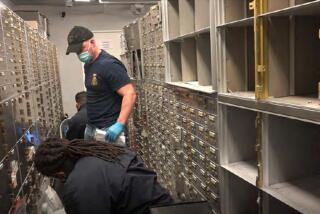Judge Freezes 2 Marcos Accounts in L.A. Bank
The Philippine government won a court order on Tuesday temporarily freezing assets valued at nearly $800,000 held for Imelda Marcos by Lloyds Bank in Los Angeles.
Superior Court Judge Jack M. Newman issued a temporary restraining order to stop what lawyers for the Republic of the Philippines said was impending transfer of the funds, pending determination of their rightful ownership.
The lawsuit, filed by attorney Jose Y. Lauchengco, said the Philippines’ Presidential Commission on Good Government, which has been searching the world to find and identify riches supposedly “purloined” by deposed President Ferdinand E. Marcos and members of his family, had discovered two accounts in Imelda Marcos’ name at Lloyds Bank.
One account, the petition said, contained U.S. Treasury bills valued at $675,000--and worth $700,000 on maturity, which would occur next Aug. 7.
The other, it said, contained $112,922, made up of cash proceeds from previously matured investments, which the bank had automatically moved into interest-bearing accounts.
Holds Brief Hearing
Newman issued his order after a brief hearing, at which no attorneys for Lloyds Bank or for the Marcos family were present.
Lauchengco said neither the Marcos family nor the bank were informed of Tuesday’s hearing, in order to forestall any possible last-minute effort to remove the funds from the court’s jurisdiction.
“These assets can easily be transferred with just one quick telephone call. We wanted to make sure they stayed in place,” Lauchengco said.
Newman scheduled a full hearing for June 7, and ordered the bank to hold the two accounts described in the petition--and any other assets held for either Ferdinand or Imelda Marcos--pending its outcome.
The petition charged that the Marcoses, while in power in the Philippines, “embarked on a grand scale of personal enrichment by purloining public funds and properties which rightfully belong to the Filipino people.”
This was accomplished, the petition continued, by such means as “demanding money, gifts, commissions and kickbacks from individuals and corporations” in connection with government contracts, by “directly raiding and looting the public treasury, treating Philippine financial institutions as if they were the defendants’ own personal banks with unlimited drawing ability” and by extortion involving use of “brute and naked force” including “summary incarceration, torture, murder and threats thereof.”
More to Read
Inside the business of entertainment
The Wide Shot brings you news, analysis and insights on everything from streaming wars to production — and what it all means for the future.
You may occasionally receive promotional content from the Los Angeles Times.










